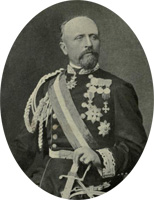| |
The
Life and Times of Giuseppe Garibaldi |
|
Giuseppe
Garibaldi (July 4, 1807 to June 2, 1888).
General
Giuseppe Garibaldi is considered the Father of Modern Italy and undoubtedly
the most admired man of the 19th century.
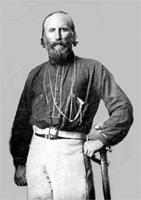
Giuseppe
Garibaldi (1807-1888).
|
General
Giuseppe Garibaldi was a real Italian HERO born on the 4th
of July.
Garibaldi:"If
it won't go on Sire, try a little powder." (as in gunpowder)!!
|
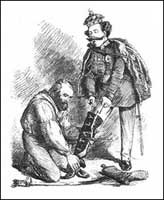
The right
leg in the boot at last.
|
On
the right can be seen a cartoon from the British magazine Punch,
circa 1865. It shows Garibaldi helping King Victor Emmanuel II put
his right leg in the boot.
In 1860, general
Garibaldi landed in Sicily with his famous 1,000 volunteers determined
to march on Rome and liberate the city. After
winning a big battle on the Volturno River, he held plebiscites in
Sicily and Naples, and then gave the whole of southern Italy to the
Count of Cavour, proclaiming Victor Emmanuel king of a united nation.
He returned to the island of Caprera, which then remained his permanent
home.
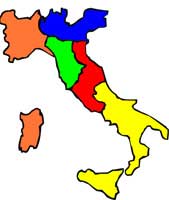
Italy
in 1859.
|
| |
Before
Garibaldi began his triumphant march northward, Italy
was divided by the Papal States.
The
Papal States or "little horn" are in red.
The
"little horn" was located between 2 seas.
(Daniel 11:45). |
|
|
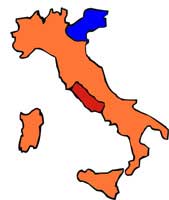
Italy in 1861.
|
The Papal States
were located between 2 seas: Mediterranean and Adriatic, as predicted
by the Prophet Daniel:
And he (Antichrist)
shall plant the tabernacles of his palace between
the seas in the glorious holy mountain; yet he shall come
to his end, and none shall help him. (Daniel: 11:45).
For centuries,
the unfortunate people of the Papal States were misruled
directly by the Popes, whose jurisdiction extended from sea to sea!
In 1862, Garibaldi
made an unsuccessful attempt to liberate Rome.
In 1867, he led
another attempt to liberate Rome also without success. Garibaldi was
like a caged lion on the island of Caprera and longed day and night
to liberate his land from the roaring lion in the Vatican.
The last obstacle
to the liberation of Rome was the greatly shrunken Papal States, also
called the Patrimony of "St. Peter."
At the beginning
of 1870, Pope Pius IX was feeling more and more secure. French bayonets
were defending the last of his temporal domain, and Garibaldi
was a prisoner on the island of Caprera. In July, Vatican Council
I declared him INFALLIBLE.
Then, like lightning,
disaster struck. France and Prussia went to war, and the French garrison
had to be withdrawn. The Italians rushed into Rome, and the fall of
the Papacy was complete.
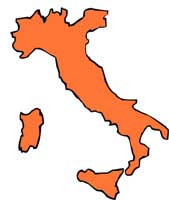
Italy
in 1871.
|
| |
General
Garibaldi did not have the honor of leading the liberation
of Rome on Sept. 20, 1870, as he was still a prisoner
on Caprera.
That
honor fell to general Raffaele Cadorna.
The
11th kingdom or "little
horn" was now gone forever???
|
|
|
|
Vatican
Council I had just declared Pope Pius IX INFALLIBLE. The Romans ignored
the infallibility decree, as he was hurled from his lofty throne,
and Rome finally became the capital of a united Italy in 1871.
The
Fall of the Papal States was a GREAT fulfillment of Bible Prophecy!!
In the book of
Daniel chapter 7, JEHOVAH showed Daniel the entire history of the
Papacy right down to the end of time. The fourth beast Roman Empire
would be divided into 2 legs, and 10 kingdoms or nations would emerge
from the Western half.
From the middle
of these 10 kingdoms an 11th kingdom
or "little horn" would emerge. This 11th
kingdom was the Papal States ruled by the dynasty of Popes.
St. Paul
refers to the Papal Dynasty as the Man of Sin, and St. John calls
him the Antichrist.
This "little
horn" would exercise dominion for 1260 years, would have a mouth
speaking great things, would make war with the saints and wear them
out, would change times and seasons etc., etc. He would have
eyes like the eyes of a man, and a look
more pompous than his fellows. That is why the Vatican is called the
See of Rome:
And the ten
horns that were on its head, and the other horn (11th)
which came up, before which three fell, namely, that horn which
had eyes and a mouth which spoke pompous words, whose appearance
was greater than his fellows. (Daniel 7:20).
The 3 nations
that were uprooted to make way for the Papal States were the Vandals
(533), Ostrogoths (545), and Lombards (755). These territories were
originally under the jurisdiction of the Emperor at Constantinople
whose exarch ruled from Ravenna.
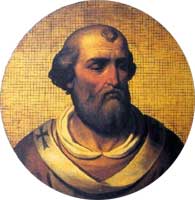
Pope Stephen
II (715-757).
Pope
from 752 to 757
|
| |
In
755, King Pepin formally handed over the territories
of the exach of Ravenna to Pope Stephen II.
That
was the official beginning of the Pope's temporal power.
If
we add 1260 years to that date, it ends in 2015,
and hopefully the end of the Papal dynasty for good!!
|
|
|
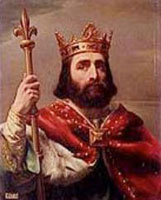
King Pepin
(714-768).
King of the Franks from 752 to 768.
|
In 606 A.D., Emperor
Phocas conferred upon the bishop of Rome the title: Universal Bishop.
If we use the famous year for a day interpretation, which all the
great Protestant expositors used, the 1260 years brings us down
to 1866.
Many eminent Bible
expositors such as Sir Isaac Newton, J. A. Wylie, Adam Clarke, Edward
Elliott, John Dowling etc., etc., also commenced the 1260 years in
755.
As there were
2 milestones in the rise of the Papacy, the Holy Scriptures seem to
predict 2 falls:
one commencing 1260 years from 606, and the other commencing 1260
years from 755:
Babylon
the great is fallen, is fallen
(Revelation 18:2).
As 1866 approached,
the "little horn" was about to lose his dominion. God had
already prepared the soldier/patriot that He would use to fulfill
this great prophecy. His name was Giuseppe Garibaldi, the humble son
of a fisherman!!
Will
the Papal States be resurrected??
As
horrendous as the very idea is to contemplate, there might
be a "resurrection" of the Papal States just before the
end of time:
And
he (Antichrist) shall plant the tabernacles of his palace between
the seas in the glorious holy mountain; yet he shall come
to his end, and none shall help him. (Daniel: 11:45).
Daniel
Chapter 7 gives the entire history of the Papal States or "little
horn" and the dominion of the "little horn" seems to
extend once again
from sea to sea . . . just before the end of time!
Since
1871, the Jesuits have been working frantically and tirelessly
to restore the lost Papal domain. The Syllabus
of Errors of Pope Pius IX condemned the idea that the Pope should
not be a temporal monarch:
76.
The abolition of the temporal power of which
the Apostolic See is possessed would contribute in the greatest
degree to the liberty and prosperity of the Church. —Allocutions
"Quibus quantisque," April 20, 1849, "Si semper antea," May 20,
1850. (Condemned as error).
When
we consider the vast military power of the Pentagon and NATO, and
the fact that they are determined to push Russia out of the Mediterranean,
the idea is not as incredulous as it might seem.
WWI
was all about restoring the lost States . . . as was WWII . . . and
the Cold War which never ended....True Christians should watch world
events very carefully for any moves in that direction.
We
can be sure of one thing that this "resurrection" will only
be for a "little season" or a very, very short time until
the Second Coming of Christ puts an end to the Papal nightmare for
good.
Official
chronology of the Father of Modern Italy
Year
|
Event
|
| 1807 |
(July
4) Born at Nice or Nizza (at that time part of France),
the son of Domenico Garibaldi, a fisherman and coastal trader.
The Great Liberator of the old world was born on the 31
birthday of the United States and just 2 years before the
Great Liberator of the New World, Abraham Lincoln in 1809.
His birthplace Nice or Nizza was always part of Italy until
it was ceded to the French in 1796. |
| 1814 |
Nice
is once again joined to the Kingdom of Piedmont-Sardinia. |
| 1824-33 |
Garibaldi
lives as a sailor in the Mediterranean and Black Sea. |
| 1832 |
He
acquires his master's certificate as a merchant captain. |
| 1833 |
In
touch with Mazzini's patriotic organization, Young Italy,
and visits its headquarters at Marseilles. |
| 1834 |
As
a naval rating in the Piedmontese navy, he takes part in
a mutiny for the republican cause. Sentenced to death by
default, after escaping to France. |
| 1835 |
Takes
casual jobs in France and with the Bey of Tunis. |
| 1836 |
Sails for Rio de Janeiro from Marseilles
in a 200 ton brigantine.
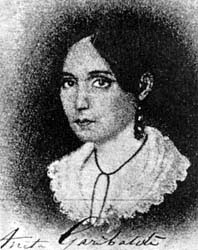
Anita
Garibaldi
He
meets his Brazilian born wife Anita who becomes his companion-in-arms
and heroine of the Risorgimento. She was
just as brave as Garibaldi often fighting side by side with
her hero husband. She died during the retreat from Rome
in '49. |
| 1836-40 |
As
soldier, corsair, and naval captain, he fights for the break-away
province of Rio Grande, in its attempt to free itself from
the Brazilian Empire. |
| 1841 |
He
tries his hand at various jobs-including cattle herdsman,
trader, and schoolmaster at Montevideo. |
| 1842 |
Put
in command of the small Orientale (Uruguayan) fleet against
Manuel de Rosas, the dictator of Argentina. |
| 1843 |
Also
becomes commander of the newly formed Italian Legion at
Montevideo. |
| 1846 |
Wins
the "battle" of St. Antonio, after which a sword
of honor is subscribed for him in Italy. Lord
John Russell is appointed Prime Minister in Great Britain. |
| 1847 |
Briefly
in command of the defense of Montevideo. Offers his services
to Pope Pius IX but is refused. |
| 1848 |
(April)
Leads eighty of his legionaries back to Italy. (July) Vainly
offers to fight for the king of Piedmont. (August) In command
of a volunteer unit at Milan against the Austrians, and
survives two brisk engagements at Luino and Morrazzone. |
| 1849 |
(February)
As an elected deputy in the Roman Assembly (after the flight
of Pius IX), he proposes the creation of a Roman Republic.
(April) As a general of brigade, he beats off an attack
by the French at the St. Pancrazio gate of Rome. (May) Defeats
a Neapolitan army at Velletri. (June) Takes a principal
part in defending Rome against further French attacks. (July)
Leads a few thousand men from Rome through central Italy
to escape from French and Austrian armies. (August) After
disbanding his men in San Marino, he is chased at sea and
on land by the Austrians; his first wife, Anita, dies. (September)
As soon as he arrives back in Piedmontese territory, he
is arrested and deported as an undesirable.
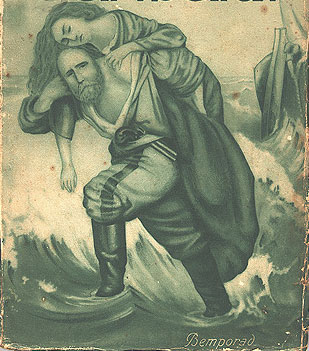
Garibaldi
is pursued by 100,000 of the Pope's soldiers. His beloved
wife Anita, who is sick and pregnant, refuses to leave his
side and she dies on the beach. The Pope had placed an enormous
bounty on his head but not one Italian betrays him to the
Papal Army.
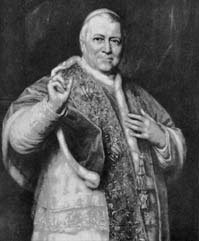
Pope
Pius IX (1846-1878).
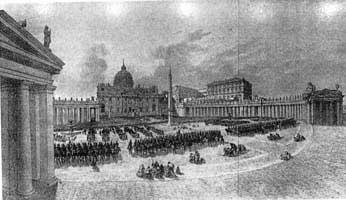
Pope
blesses the victorious French Army at the Vatican.
Pope
Pius IX was the longest reigning Pope in history and the
great antagonist of Italian unity. During his reign the
firing squads and the scaffolds were kept busy day and night.
He urged the Austrians to set up the guillotine and he would
not allow railroads to be built in the Papal States! |
| 1849-50 |
Lives
for seven months in Tangiers, where he writes the first
edition of his memoirs. |
| 1850-51 |

Ticker
tape parade on Broadway.
Garibaldi
was offered a ticker tape parade up the "canyon of
heroes" in New York City. The Jesuits stirred up the
Irish Catholics against him and in order to keep the peace
he refused the offer. Of all the many world famous personalities
to have been offered this singular honor, Garibaldi remains
the only person to date to have refused it!!

Garibaldi
stayed at this house on Staten Island, New York. It was
the home of inventor Antonio Meucci who is said to have
invented the telephone before Alexander Graham Bell!!

Garibaldi
Monument in New York City.
Garibaldi
statue in Washington Sq. Park, downtown New York City. Make
it destination #1 when you visit the Big Apple. |
| 1851-52 |
Travels
to Peru. |
| 1852-53 |
As
a "citizen of Peru," he captains a clipper to
the far east, returning to Lima via Australia and New Zealand. |
| 1854 |
Returns
by way of New York, carrying a cargo of coal from Newcastle
(England) to Genoa. |
| 1855 |
Engaged
to an English lady, Mrs. Emma Roberts. Buys part of the
Island of Caprera, north of Sardinia. |
| 1856 |
Comes
to England on a scheme (largely financed by individual British
politicians and British secret service funds) to buy a ship
and lead an expedition to release political prisoners in
Naples; but the ship is wrecked. |
| 1858 |
Goes
to Turin to meet Count Cavour, the Piedmontese Prime Minister,
who wants him to organize a corps of volunteers, in anticipation
of another war against Austria. |
| 1859 |
(April)
As a general in the Piedmontese army, he forms this corps,
the Cacciatori delle Alpi, and war begins. (May)
Takes Varese and Como, while the main Franco-Piedmontese
forces are fighting in the plain of Lombardy. (September)
After the armistice of Villafranco, Baron Ricosok gives
him command of the army of Tuscany. (November) When his
project to march into the Papal States is overruled, he
returns to civil life. |
| 1860 |
(April)
As deputy for Nice in the Piedmontese parliament at
Turin, he attacks Cavour for ceding Nice to Louis Napoleon,
Emperor of the French. (May) He sets out with a thousand
volunteers on a piratical raid against the forces of the
Neapolitan Bourbons. After an engagement at Calatafimi,
he captures Palermo, the capital of Sicily. (July) He wins
the battle of Milazzo, near Messina. (August) Crosses the
Straits of Messina, eluding the sizable Neapolitan navy.
(September) After a lightning campaign in Calabria, he captures
Naples, the largest town in Italy, and makes himself "Dictator
of the Two Sicilies." (October) After a big battle
on the Volturno River, he holds plebiscites in Sicily and
Naples, and then gives the whole of southern Italy to Cavour,
proclaiming Victor Emanuel as King of a united nation. (November)
He returns to Caprera, which now remains permanently his
home. |
| 1861 |
(April)
He attacks Cavour in parliament over the latter's ungenerous
treatment of the volunteers. (July) President Lincoln offers
him a command in the American Civil War, but has to withdraw
the offer after a storm of protest from the Vatican. |
| 1862 |
(July)
He begins agitating in Sicily for another march on Rome,
evidently with some encouragement from the King and Rattazzi,
the Prime Minister. (August) Seriously wounded in a clash
with Italian troops at Aspromonte, in Calabria. (October)
After being imprisoned, he is granted an amnesty by the
King. |
| 1863 |
Resigns
from parliament because of martial law being applied in
Sicily. |
| 1864 |
Triumphal
reception in England.
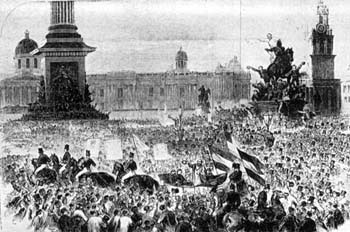
Garibaldi
welcomed in London.
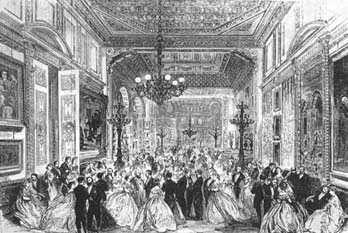
A
reception given by the Duchess of Sutherland at Stafford
House.
The
whole country shut down for 3 days when Garibaldi visited
London in 1864. High and low received him except Queen Victoria
and the royal family. Thousands of children lined the streets
and they all chanted this little ditty:
We'll
get a rope,
And
hang the Pope:
So
up with Garibaldi! |
|
| 1866 |
Leads
another volunteer army in a new war against Austria, after
which Venice is joined to Italy. |
| 1867 |
Again
attempts a march on Rome, but is beaten by papal and French
forces at Mentana, and once again is arrested by the Italian
government. |
| 1870 |
Joins republican France in the Franco-Prussian
war, and is made commander of an army in the Vosges....This
is one of the most important years in history. After 1260
years, Rome ceases to be governed by the Popes and becomes
the Capital of the new united Italy. Pius IX declares himself
infallible in the same year!!
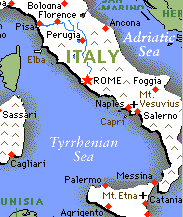
Map of Italy
after the fall of the Papal States.
The Fourth Beast Papal Rome
receives a deadly wound from the sword of Garibaldi.
|
| 1879 |
Comes
to Rome in an attempt to organize the parliamentary opposition
against Depretis, the Prime Minister. The Court of Appeal
annuls his twenty-year-old marriage to the Marchesina Raimondi,
so that he can marry a third wife, Francesca Armosino, by
whom he already has several children. |
| 1882 |
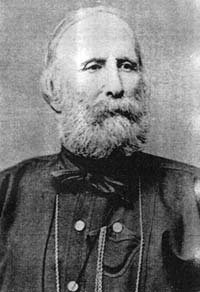
Garibaldi
in his golden years. (June
2) Dies and goes to his eternal reward in Heaven.
|
| 1929 |
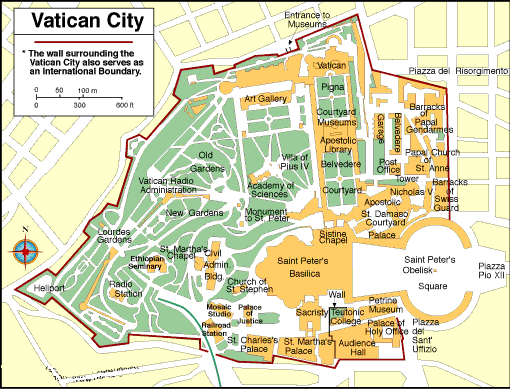
Vatican
City State.
Thanks
to Benito Mussolini, the beast that was slain came to life
again. From that time onwards most of the nations of the
world started to recognize the Vatican and send Ambassadors
to its headquarters including the U.S. in 1984:
".
. . which had the wound by a sword . . . whose
deadly wound was healed . . . And all that dwell upon
the earth shall worship him, whose names are not
written in the book of life of the Lamb slain from the
foundation of the world" (Rev. chapter 13).
|
Editor's
Notes
The recent
best-selling book: Hitler's Pope: the Secret History of Pius XII,
by John Cornwell says that the main goal of the Vatican since 1870
was to get back the Papal States. The German Kaiser had a secret agreement
with Rome that in the event of a German victory in WW I, he would
give back the land which they claimed was stolen by the Republicans.
Adolf Hitler,
an Austrian, promised them the same deal if he was victorious. German
troops invaded Italy in 1943 —the first foreign soldiers since
1870— and had Hitler been victorious he would have handed back
the Papal States. The Italians fought on Hitler's side but the Pope
planned to double-cross them and divide up the country once again!!
It is amazing
that this great hero's life was never filmed by Hollywood....It is
not strange at all when we realize that Hollywood has always
been run by the greatest enemies of Italian unity, the Jesuits.
Vatican
City State must be abolished....It is a dagger aimed
at the heart of Italy. There are 2 ambassadors from Rome to the United
States: One is the official ambassador that represents the Italian
Republic and the other is the Papal Nuncio. A house divided against
itself cannot stand.
Garibaldi
would never have consented to its creation in 1929 by Fascist Mussolini.
We know that Pope and Pentagon are working together to divide
Italy once again and turn the clock back to the Dark Ages. Feeble
men are still fighting against the Almighty and
trying to negate His Word!
Links
Italian National Anthem
Garibaldi History
site at the University of South Carolina.
Garibaldi's
Letter to President Lincoln Updated
12-12-99.
Papal States
Nuns
are not "twisted sisters" Vatican tells Italians: Special
report from the BBC
References
Burton, Jean,
Garabaldi: Knight of Liberty, 1945.
Campanella,
Anthony P. Garibaldi's Memoirs,
South Carolina, 1981.
Davenport,
Marcia, Garibaldi: Father of Modern Italy,
New York, 1957.
Garibaldi:
Great Lives Observed, by Dennis Mack Smith, Prentice-Hall,
New Jersey, 1969.
Trevelyan,
George Macaulay, Garibaldi
& the Making of Italy, New York,
1911.
Parris,
John The Lion of Caprera: A biography of Giuseppe Garibaldi,
London, 1962.
Back
to Main Menu
|





